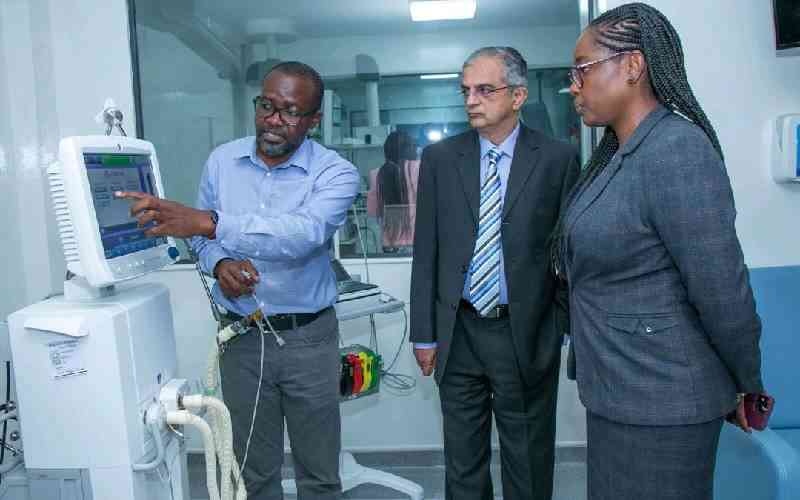What is the worth of the life of a Kenyan citizen? The question lingers on with you, long after you have visited the Level Five Referral Hospital that is the former Provincial General Hospital in Kakamega. For, I have recently accompanied a friend to the eye-opener that is the one stop shop for healthcare in the former Western Province, to visit his ailing mother. Put simply, the place is pathetic – perhaps worse than pathetic. It is a slap in the face of the health component of President Uhuru Kenyatta’s Big Four Agenda. It is a mockery to healthcare generally.
The external edifice is impressive. The tight fence opens into a compound with whitewashed walls and neat lawns. The external beauty belies what awaits you in the buildings. We presently walk into the ward. It is a messy beehive of activity. The place is overflowing with humankind. The sick are pasted in distressing rickety beds with scanty linen. Cloistering them are the rest of us. Coloured water passing for white tea is served in dilapidated plastic. There is something near a desperate scramble for this liquid.
I soon get to learn that the overcrowding is a factor of discharged patients with pending hospital fees. They cannot be allowed to leave the hospital until they clear their fees. The irony is that the bill grows by the day. And so the discharged persons are veritable prisoners in the healthcare facility. It is anybody’s guess whether they will eventually go home, someday. Bereft of anything much to do with themselves, they generally mill about the place, lending sundry support to the sick. This is done in exchange for cash tokens. These “prisoners” would seem to constitute three out of ten of the inmates. Add on the rest of us and the place is a true marketplace.
Next-door are the washrooms. An overpowering hybrid of offensive smells wafts across from the washrooms to dominate the ward. I venture to visit these hollies of the hollies, to get a detailed perspective. It is horrific – and I will spare you the agony of the description. Who is in charge of this mess? Does it occur to him that those who are supposed to use this facility are just as human as he is? It turns out that the sorry state of the hospital is just the tip of the iceberg. The patient whom we have come to see has been here for a week. She has been solely on the water drip and painkillers. The professional who admitted her says that she needs specialised attention from a gynecologist.
Apparently, this Level Five regional referral hospital has only one gynecologist. A week later the patient is still waiting for the famous gynecologist. Others have waited longer. We have learned that the specialist is in Nairobi, “attending to some very pressing personal challenges.” His phone has been switched off since two days ago. Nobody can tell when to expect him, or the phone to be switched back. Efforts to reach the hospital administrator for direction are equally futile. His phone has also been switched off, we don’t know since when.
And here I am, wondering how such a hospital could only have a single specialist in gynecology. And I have heard there are specialists out there, begging for jobs in these hospitals. How many women require gynecological attention in this referral hospital? You cannot help wondering whether other areas of healthcare in the hospital have specialists. Equally, you cannot help wondering whether if they exist these specialists could also be in Nairobi, “attending to some very pressing personal challenges” with their phones switched off.
I am reminded of similar challenges that journalists have recently unearthed in Kirinyaga County’s Level Five Referral Hospital. Could this be an endemic problem across the country? Could there be need for a task force to find out what is happening in public hospitals? Is it true, after all, that it was a mistake to devolve healthcare?
But there is something else to be said about these things. Without a doubt, the challenges in public hospitals are a factor of the reality that they are regarded as the poor man’s hospitals. It is the tragedy of life that institutions are in the hands of people who have no faith in them.
When the Cabinet Secretary gets treatment from private hospitals, her commitment to the quality of public hospitals is likely to be questionable. Elsewhere, what quality of education do you expect in public schools, if the Cabinet Secretary in charge sends her children to a British or American system? Why do we allow people to be in charge of institutions they have no faith in?
Every so often you will hear that some Governor is receiving treatment in South Africa, India, the UK or in the US. Yet this is the same person in whose charge the destiny of our hospitals resides. And every so often, an African Minister for Health returns home as air cargo from some offshore hospital – because he had no faith in his own hospitals at home. It is a joke to expect quality healthcare to be provided by people with no faith in our hospitals.
Going forward, Kenyans need a law that prohibits state officers from being in charge of services that they don’t patronise. Governors and Ministers who want to be treated in private hospitals should first resign from their positions. When in flight, you get comfort from the knowledge that the pilot is on board with you. Your fate is tied together in the same knot. You have cause to feel safe with the captain.
- The writer is a strategic public communications adviser. www.barrackmuluka.co.ke
 The Standard Group Plc is a
multi-media organization with investments in media platforms spanning newspaper
print operations, television, radio broadcasting, digital and online services. The
Standard Group is recognized as a leading multi-media house in Kenya with a key
influence in matters of national and international interest.
The Standard Group Plc is a
multi-media organization with investments in media platforms spanning newspaper
print operations, television, radio broadcasting, digital and online services. The
Standard Group is recognized as a leading multi-media house in Kenya with a key
influence in matters of national and international interest.
 The Standard Group Plc is a
multi-media organization with investments in media platforms spanning newspaper
print operations, television, radio broadcasting, digital and online services. The
Standard Group is recognized as a leading multi-media house in Kenya with a key
influence in matters of national and international interest.
The Standard Group Plc is a
multi-media organization with investments in media platforms spanning newspaper
print operations, television, radio broadcasting, digital and online services. The
Standard Group is recognized as a leading multi-media house in Kenya with a key
influence in matters of national and international interest.









